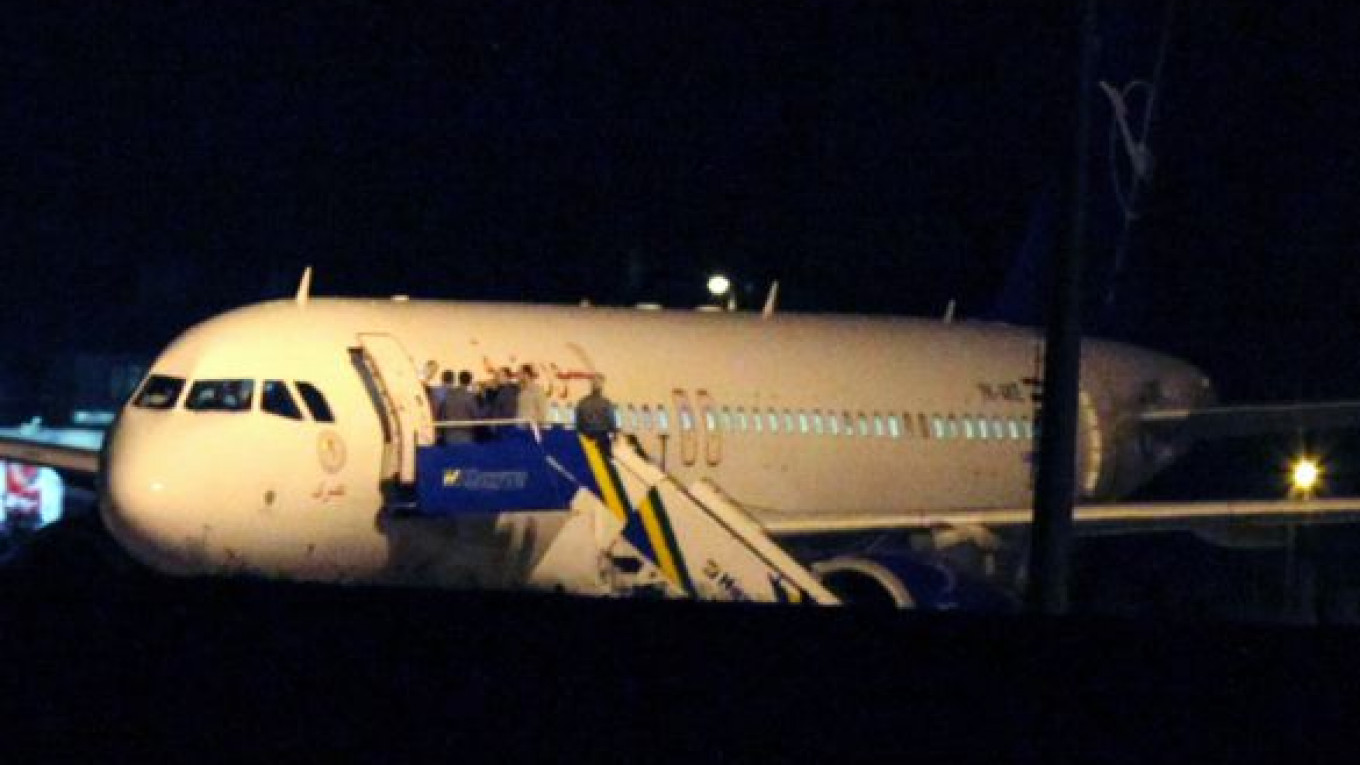Turkish Prime Minister Tayyip Erdogan said on Thursday that a civilian plane headed to Syria grounded by Turkish fighter jets was carrying Russian-made munitions, an announcement that could put strain into Moscow's relationship with Ankara.
Erdogan said the plane was carrying ammunition from the Russian equivalent of Turkey’s Mechanical and Chemical Industry Corporation to the Syrian Defense Ministry.
His comments followed a murkier description of the cargo, found on the Syrian Air jet flying from Moscow to Damascus on Wednesday, by the Turkish Foreign Ministry.
Turkish Foreign Minister Ahmet Davutoglu had said earlier Thursday that Turkey had grounded the plane based on intelligence that its cargo was “of a nature that could not possibly be in compliance with the rules of civil aviation.”
The Russian Foreign Ministry, which did not give official comment on the nature of the cargo, said it was “troubled” by Turkey’s grounding of the plane, which it said had 17 Russian citizens on board, alleging that the incident had endangered their lives.
“The Russian side continues to insist on an explanation of the reasons for these actions by the Turkish authorities in relation to Russian citizens and that measures be taken to prevent such incidents in the future,” Foreign Ministry spokesman Alexander Lukashevich said in a statement.
An unidentified Russian arms export official on Thursday denied that the plane was carrying arms.
Davutoglu said it was “unacceptable” for the country’s airspace to be used for weapons transfers to the Syrian government, which Turkey fervently opposes.
“We are determined to control weapons transfers to a regime that carries out such brutal massacres against civilians,” Davutoglu said in remarks shown live on Turkish television.
Erdogan’s announcement that there were Russian-made munitions on the plane could produce tension in Turkish-Russian relations.
A report published in Thursday’s issue of Vedomosti said President Vladimir Putin had delayed a trip to Ankara previously set for Sunday. Putin’s spokesman, Dmitry Peskov, told Interfax that the visit could take place Dec. 3.
Russia is one of Syria’s few close allies after months of civil unrest that has killed thousands of Syrians and recently spilled over the border into Turkey.
Late Wednesday afternoon, Turkish F-16 fighter jets forced the Syrian Air A320 jet with 25 to 35 passengers on board to land at Ankara’s airport, where Turkish authorities removed communications equipment, radios and radio jammers before allowing the plane to leave nine hours later, at 2:30 a.m., local media reported.
Syrian Air, the country’s national air carrier, offers a weekly charter flight between Damascus and Moscow’s Vnukovo Airport. The plane left 20 minutes after its scheduled departure time of 3:06 p.m. Wednesday, Interfax said, citing airport spokeswoman Yelena Krylova.
Lukashevich, the Foreign Ministry spokesman, said Russia has demanded an official explanation from Turkey for grounding the plane.
On Thursday, Turkey’s ambassador to Russia visited the Foreign Ministry in Moscow, while the Russian ambassador to Turkey went to the Turkish Foreign Ministry in Ankara for talks.
Russian officials and military analysts cast doubt on Turkey’s claims that the plane was carrying arms, saying it was unlikely that Russia would transport weapons on a civilian aircraft.
Yelena Kara-Sal, an official at the Russian Consulate in Ankara, told Itar-Tass that the equipment on board was not Russian in origin, while a senior Russian official from the arms export industry denied that any military equipment could have been found.
“No weapons, systems or other kinds of military equipment was on board the passenger aircraft, nor could there be,” the unidentified official told Interfax.
He said Russia would never carry out military sales to Syria illegally, “especially with the use of civilians.”
That view was echoed by defense industry analyst Igor Korotchenko, who said he doubted that Russia would use a civilian plane to carry military equipment.
Korotchenko also said Turkey would be more open on the details of the seized cargo if it was military in nature.
“If they found something like that, it would be immediately shown on all the television channels,” Korotchenko, editor of the National Defense magazine, said.
But the arms export official who spoke to Interfax pointed out that Russia has not halted military cooperation with Syria.
Russia has been a major arms supplier to Syria in recent years, with sales of $1.3 billion over the period 2002-2009.
In June, a Russian cargo ship carrying helicopters destined for Syria was forced to turn back after the ship’s British insurer canceled its coverage. Russia said at the time that the helicopters had been undergoing maintenance in Russia.
An unidentified military official told Interfax in July that the helicopters would be delivered to Syria after the country stabilizes.
Alexander Perenzhiyev, a member of the Association of Military Experts, said Syria is not interested in a fight with Turkey and that a third party might be trying to provoke a conflict.
A Message from The Moscow Times:
Dear readers,
We are facing unprecedented challenges. Russia's Prosecutor General's Office has designated The Moscow Times as an "undesirable" organization, criminalizing our work and putting our staff at risk of prosecution. This follows our earlier unjust labeling as a "foreign agent."
These actions are direct attempts to silence independent journalism in Russia. The authorities claim our work "discredits the decisions of the Russian leadership." We see things differently: we strive to provide accurate, unbiased reporting on Russia.
We, the journalists of The Moscow Times, refuse to be silenced. But to continue our work, we need your help.
Your support, no matter how small, makes a world of difference. If you can, please support us monthly starting from just $2. It's quick to set up, and every contribution makes a significant impact.
By supporting The Moscow Times, you're defending open, independent journalism in the face of repression. Thank you for standing with us.
Remind me later.


